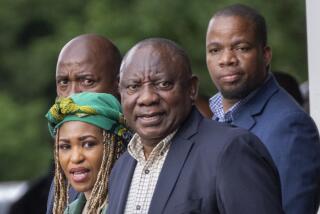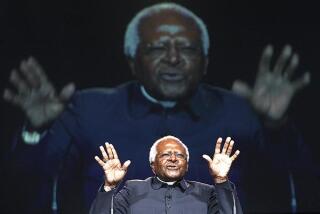Trial Becomes the Winnie Mandela Show
- Share via
JOHANNESBURG, South Africa — On the first day of Winnie Mandela’s trial, a red Mercedes-Benz delivered the defendant and her husband to the courthouse steps. With a radiant smile, she stepped into the waiting horde of reporters and photographers.
But the smile vanished when one newsman asked Nelson Mandela, a former trial lawyer, a question about legal strategy in his wife’s case.
“My husband is not on trial, sir,” she snapped in a tone that suggested she was the star of this show. As the questioner, Bill Schiller of the Toronto Star, later observed: “You don’t mess with Winnie Mandela.”
Her contentious manner and steely resolve in the face of years of government and police harassment has made Winnie Mandela a world hero and, apart from her husband, South Africa’s most famous anti-apartheid activist.
She thoroughly charmed Americans during the couple’s tour last June of the United States, which included a rally at the Los Angeles Coliseum and dinner with Hollywood’s finest and richest. She wowed a studio audience on “Donahue,” and at each stop in the country, fans would summon her to the microphone with shouts of “Winnie! Winnie! Winnie!”
Now her kidnaping and assault case, which began last week and resumes today, has become the closest thing to a Hollywood trial that South Africa has ever seen. It is, without doubt, the hottest ticket in town.
Several dozen photographers camp on the courthouse steps early each morning, and passersby crane to catch a glimpse of the famous couple as they enter and leave the building. At lunchtime, they are escorted across a busy four-lane street to their attorneys’ offices by 100 or so well-wishers.
The 100 seats in the wood-paneled courtroom are at a premium, and marshals from Mandela’s African National Congress stand alongside white police officers to identify friends and family as they enter.
The government’s Bureau for Information issues laminated credentials each day for reporters covering the proceedings, and the Foreign Correspondents Assn. has set up four rotating rosters of journalists to occupy the 10 seats that foreign publications and broadcasters have been allocated inside.
Fleet Street reporters lurk in the hallways and speak of high interest among the tabloid newspapers back home in London. Riaan Malan, author of the critically acclaimed book “My Traitor’s Heart,” was spotted outside the courtroom the other day, dictating notes into a tape recorder.
Winnie Mandela’s supporters and detractors seem to gather in equal numbers in the summer sun outside. Few are willing to talk to reporters, and even fewer are willing to give their full names.
“I’m here to support the ‘mother of the nation,’ ” said Johanns, a 24-year-old black student. “We know she didn’t do anything and it’s just stories.”
But Martha, a 50-year-old bookkeeper, declared: “Of course she’s guilty. She killed our children. She must pay for it.”
The state accuses Mrs. Mandela of ordering the abduction of four men from a Methodist church halfway house in Soweto in December, 1988, and then helping to beat them at her home. One of those attacked, 14-year-old Stompie Seipei, died of his injuries. The other three men are key witnesses for the prosecution.
Each day at the trial, Nelson Mandela has taken a seat in the center of the third row of benches, which rise like bleachers. Facing Mandela and the other spectators is Justice M.S. Stegmann, a balding white man in a red-and-black robe with a white collar. Lawyers on both sides say Stegmann is a fair and evenhanded judge.
Usually dressed in a conservative suit, Winnie Mandela sits solemnly in “the dock,” a walled pew in front, alongside the other three defendants--her driver, John Morgan; a friend, Xoliswa Falati, and Falati’s 18-year-old daughter, Nompumelelo. Each defendant is identified by the number on a yellow card tied to the bench. Mrs. Mandela is Accused No. 8. (Four of the other defendants have skipped bail.)
She laughs and jokes with her friends in the gallery during breaks in the trial; she is free on a personal recognizance bail. During the tedious legal arguments of the opening days last week, she brought a book to keep her occupied. Its title: “South Africa--Time Running Out.”
She is represented by a team of four lawyers in black robes led by George Bizos, who helped defend Nelson Mandela during the Rivonia treason trial, at which the ANC leader was sentenced to life in prison.
Bizos, a short, stout, white-haired advocate, figures he has defended Winnie Mandela 25 times over the years in cases arising from her defiance of government orders banning her from speaking to more than three people at a time and banishing her for eight years to a village far from Soweto.
But this case is different. For several years, Soweto residents, including ANC supporters, complained that Mrs. Mandela’s band of young bodyguards, known as the Mandela United Football Club, terrorized the community. The club, since disbanded, reportedly has been linked to 16 murders, and four club members have been sentenced to death in murder cases.
Friends of Winnie Mandela contend that the bodyguards were operating on their own, without her knowledge. If she was guilty of anything, they say, it was being too trusting of the people around her.
“She takes in people. She won’t question them. She takes them at face value,” said Fatima Meer, the Mandela family’s biographer. “They (the bodyguards) did whatever they wanted to.”
Mrs. Mandela herself says the state’s charges are an attempt to get at her husband. And even though the ANC has claimed the trial is an attempt to “persecute Comrade Winnie,” she has welcomed the proceedings, saying they will give her a chance to clear her name.
Some respected black leaders in Soweto say they believe Mrs. Mandela should be convicted of the charges. And many in the anti-apartheid movement tried to muzzle her outspokenness when Nelson Mandela was freed from prison.
That worked for awhile, but she re-entered the spotlight during the couple’s U.S. tour.
Julie Belafonte, wife of singer Harry Belafonte, who helped organize the Mandelas’ U.S. visit, was quoted last year as saying Winnie Mandela is “a wonderful role model for women.”
“We don’t know what happened over there,” she said at the time, “and in any case it’s irrelevant in relation to the positive power she has displayed and the pressure she has been under.”
A few weeks after her return to South Africa, Winnie Mandela was appointed head of the ANC’s social welfare department, despite objections from several ANC chapters. She also was elected to the executive committee of the ANC’s Johannesburg chapter as well as made chairwoman of the ANC women’s league in Johannesburg.
Nelson Mandela is, by all accounts, deeply in love with his wife. And friends say he blames himself for her troubles.
On the day after his release last year, Mandela told reporters that his biggest regret about his 27 years in prison was that “my wife has been under all sorts of pressure. It is not a nice feeling for a man to see his family, struggling, without security, without the dignity of the head of the family around.”
More to Read
Sign up for Essential California
The most important California stories and recommendations in your inbox every morning.
You may occasionally receive promotional content from the Los Angeles Times.














